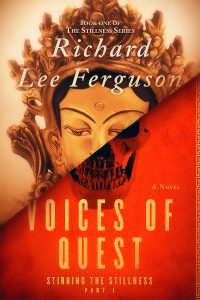About Stirring the Stillness Part 1, Voices of Quest:
The replacement of humans has begun. It starts with the voices . . .
It is war-ravaged China in the 1930’s. John Powers and his fellow group of pilgrims are trying to evade Nationalist forces, communist rebels and the invading Japanese army, all while carrying a strange golden statue and searching for a mysterious woman known as Her. At the same time, John begins hearing voices insisting that he conceive a son with another of the travelers.
Who is Her? Why do the voices want John to have a son? Are the voices evidence that John has schizophrenia, as he fears? Or are they something else altogether?
Buy the book, and follow the author on social media:
Learn more about the writer. Visit the Author’s Website.
Author Bio:
Richard Lee Ferguson has been passionate about Asia from a young age when his father, a Marine officer, told him stories about war-torn China. His passion grew deeper as a result of his own experiences in Vietnam where he spent almost a year in the jungle fighting the Viet Cong, the North Vietnamese Army, and malaria. After returning from the war, he obtained a Master’s Degree in Asian Studies; learned to speak, read and write Chinese; established numerous businesses in Asia; and became an international lawyer. He practiced international law, advised businesses on their global operations and strategies, lectured at local universities on Asian culture and business law, traveled frequently to Asia, participated in seminars in Vietnam and China for business and government leaders, and taught graduate students at the University of San Diego (UCSD) and San Diego State University. He is currently living with his wife in a secluded rural town veiled by the forests of Northern California writing and teaching young students the values of analytical thinking and questioning. The Stillness Series came about for many reasons, but the four most important involve a Vietnamese woman giving birth in the middle of a monsoon, a dead North Vietnamese soldier, Homer’s Iliad, and schizophrenia.

Leave a Reply